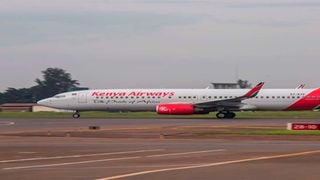
A Kenya Airways plane. The national carrier flies to 56 destinations worldwide, 46 of which are in Africa. The government will implement a multi-year reform of the airline, including the takeover of a Sh93.52 billion debt.
| Cyril Ndegeya | Nation Media GroupCompanies
Premium
Kenya Airways to cut jobs, fleet size in recovery plan
What you need to know:
- KQ ended 2020 with a workforce of 3,652, having lost about 1,123 employees
- The government is the largest shareholder in KQ with a 48.7 percent stake
The troubled national carrier, Kenya Airways, is set for a major shake-up— including cuts on its fleet size, jobs, route network, and flight frequency— as part of a Sh133 billion restructure plan aimed at saving the airline from collapse.
A report by the Treasury says the State will implement a multi-year reform of the airline, including the takeover of a Sh93.52 billion debt.
In the plan is also the provision of Sh53.49 billion in direct budgetary support over the next two years to clear the carrier’s overdue payment obligations and cover the upfront costs of restructuring.
“The restructuring plan aims to enable KQ’s adaptation to the challenges facing the aviation industry in the post-Covid pandemic environment,” Treasury Cabinet Secretary Ukur Yattani says in a report to the International Monetary Fund (IMF).
The Government of Kenya (GoK) is the largest shareholder in KQ with a 48.7 percent equity share and its exposure to the airline also includes Sh84.81 billion of guarantees to creditors.
According to the restructuring plan, KQ will be required to trim its network, rationalise the frequencies of flights, operate a smaller fleet, and maintain a lean workforce.
The carrier has a 36-aircraft fleet, 19 of which it wholly owns while the rest are leased. Embraer makes up the bulk of its fleet with 15 aircraft.
The airline flies to 56 destinations worldwide— 46 of which are in Africa.
The airline ended 2020 with a workforce of 3,652, having lost about 1,123 employees. Half of the airline staff left through resignations or voluntary early retirements.
In a strategy aimed at safeguarding the success of the reforms at KQ, the Treasury said the airline’s board of directors would be placed on a performance tracker.
“This will involve implementing a tracker to monitor key actions and milestones in the restructuring process e.g trimming the network, rationalising frequencies and the fleet, and addressing the high-cost structure— including the salary or wage bill with a clear measuring system” Mr Yatani said.
Milestones will be included in the key performance indicators applying to KQ’s Chief Executive Allan Kilavuka and other senior executives.
“By December, we will prepare a loan agreement with KQ that shall include conditions for providing financial support to implement the restructuring plan. It will include clear KPIs, timelines, and a reporting obligations and disbursement plan” Mr Yatani further said, adding that the signing of loan agreements will take place after Parliament’s approval of a supplementary budget set for early next year.
Owing to its severe cash flow problems over the past three years, KQ has not been able to pay lessors and creditors' due invoices, resulting in significant outstanding obligations.
The company had to negotiate moratoriums and waivers with lenders and lessors and has been dependent on cash injections from the budget.
Even before the pandemic, this was negatively impacting KQ’s operations.
“Recognising that full execution of the restructuring plan is essential to ensure that the strategy is carried out at least cost to the Exchequer, we will implement safeguards to that effect. GoK and KQ management will be acting resolutely to minimise cash burn while waiting for the restructuring to take place” Mr Yatani said.
A UK consultancy firm Steer Group in August submitted a report on the most viable options of revamping the airline in the face of deepening financial losses and depressed passenger numbers.
Crafting a viable turnaround strategy for KQ was one of the conditions for the Sh255 billion-loan to the government from the IMF in March.
In the loan deal, Kenya committed to audit and reform the operations of nine key State-owned enterprises (SOEs) to ensure their viability.
These are KQ, the Kenya Airports Authority, the Kenya Railways Corporation, Kenya Power and Lighting Company, the Kenya Electricity Generating Company, the Kenya Ports Authority, and three of the largest universities.
For KQ, the government committed to hiring an independent consultant to audit the airline and find the cheapest way of restructuring it.
The airline posted a Sh11.49 billion net loss in the six months ended June — a 19.8 percent cut from the Sh14.33 billion loss it incurred in the preceding similar period.
This took its accumulated losses over the years to above Sh127 billion.
KQ’s liabilities outstripped assets by Sh73.85 billion as at end of June compared with Sh64.16 billion in June last year, keeping it technically insolvent.
Accumulated losses and revenue dip caused the company to breach the terms set by the global financiers, underlining the airline’s debt distress.
KQ was privatised 24 years ago but sank into debt and losses in 2014 after a failed expansion drive, costly purchase of aircraft, and a slump in travellers after a major terror attack.
The Kenya Aviation Management Bill, 2020, seeks to nationalise KQ and make it one of the subsidiaries of a holding company to be known as the Kenya Aviation Investment Corporation.
The others will be Kenya Airports Authority, which will operate all the country’s airports, including Jomo Kenyatta International Airport (JKIA) in Nairobi, under an investment arm dubbed Aviation Investment Corporation.
The Bill underwent the First Reading in Parliament on June 30, 2020, but has since run into headwinds over claims of inadequate public participation.





